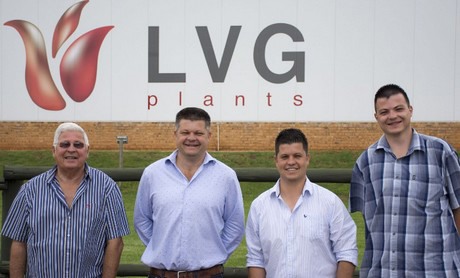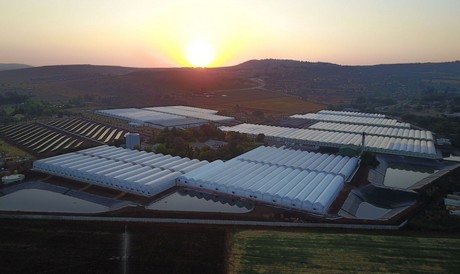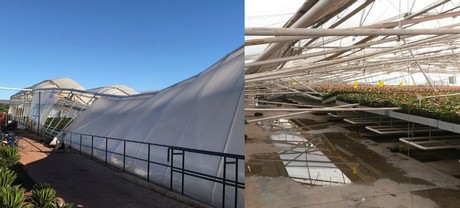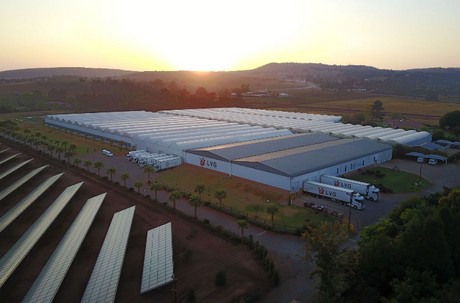LVG Plants in South Africa is a customer of Anthura. The owners, who are originally Dutch and have lived almost all their lives in South Africa, have made enormous developments with their company. The brothers – Ivo, Bart and Geert – all have their own roles within the company. In the latest edition of Anthurinfo, Managing Director of LVG Plants Geert van Geest is talking extensively about his company, the challenges it faces and the future prospects it sees.

Can you tell us how you ended up in South Africa?
My father Lourens used to grow flowers in Naaldwijk, the Netherlands. At the time, a flower grower from South Africa and a Dutch greenhouse visited my father. The wanted to see the newly built greenhouse. The South African asked my father if he would like to work for them in South Africa, and then the seed was planted. My parents visited South Africa and thought it was a beautiful country. They were excited about relocating there. We emigrated in 1983. I now live with my wife and children at our company.

How did LVG Plants come into being?
My father started as a flower buyer at the flower auction in Johannesburg for the Toxopeus family. This family founded the flower auction business in South Africa. In 1986, together with this family, my father founded the pot plant branch of LVG (Lourens van Geest) Plants that mainly produced houseplants. In 1995, we acquired the shares of the Toxopeus family and we rented the production location. We bought our own plot of land in 1997 and systematically moved from the rented premises to our own current premises in Krugersdorp, Johannesburg.
Just before the millennium we separated production from sales and sales from logistics. The latter by establishing Plantimex. Soon after that, we switched from green to flowering houseplants as the demand was greater and planning was easier. Anthuriums were our first flowering line which was a must in the flowering range and in 2001 we received Phalaenopsis pot plants samples for testing. Later we added them to our assortment. Over the years we expanded our range and currently we grow 20 different products, including pot Roses, Spathiphyllum, Cyclamen, Begonia and Zantedeschia.
In 2016 you invested in sustainability. Can you tell us something about that?
We built a solar collector field of 7,000 m² to heat water which reduced the use of coal for this purpose. We are quite proud of this project as it is the largest solar collector field in the southern hemisphere.

In 2017, your company was hit by a tornado, resulting in enormous damage. What happened and how did you tackle it?
Of the 11 hectares of greenhouse, three hectares were destroyed in just a few minutes. The tornado also caused damage to other parts of the nursery which could be restored. The three hectares had to be rebuilt. This took a great deal of intense work, involving important decisions and long term choices which had to be completed in a very short period of time. The real question was 'where do we start'? Greenhouse building material and expertise to a large extent was not available in South Africa. The new greenhouses, for example, were imported from Belgium.
All our Phalaenopsis and Anthurium plants were destroyed by the tornado. We rebuilt everything in phases and completed in November 2018. The reconstruction took a little over a year with a lot of stress, uncertainty and frustration, but also a lot of understanding, help and commitment from other people. This experience was heart-warming as it was a tough period.
What is the current structure of your company?
My older brother Ivo is responsible for the commercial side of the business and Bart, my younger brother, is responsible for the production and is the only child born in South Africa. LVG employs 400 people. Whilst we all live on the company premises, my father still serves in an advisory role. He spends his time between the farm and his home in Cape Town. During the South African winter, he visits the Netherlands.
What is the biggest difference with the Netherlands in terms of production and sales?
We grow our own plants and have direct contact with our customers. We also take care of the planning, sales and marketing of our products as well as the logistics thereof. A wide range of products is essential to optimally supply plants to customers outside the Johannesburg area. Here we cater for and supply to a variety of customers including retail chain stores.
Your own distribution and sales organisation for the retail sector is thus successful. Why do you think that is?
We have access to vital information in terms of the retail sector and what the market requires. This includes sales figures, product varieties, colour demand, shelf life, pot size, trends etc. This information is shared with the customers to assist them in their planning. Our expertise and knowledge in the industry gained over the years has allowed us to build solid lasting relationships with our customers. These relationships are built on trust and understanding. Besides open communication, trust is paramount.

What else could we learn from you in the Netherlands?
Direct sales and access to the retail sector and knowing what the consumer demand is. Lastly, in my opinion your biggest stumbling block is that you need to spread more risk and introduce polycultures as there are too many companies that only focus on one certain product.
What else can you learn from similar Dutch companies?
In South Africa we need to become more streamlined and we should introduce automation. This is difficult with a wide range of products and lack of service providers.
How do you see the future of LVG Plants?
Political and economic conditions are complex and challenging in South Africa, but we remain positive. The rise of the middle class will continue and that sector must grow. We ourselves expect to grow and continue to develop, because stagnation means decline. It is no surprise that we are planning to build an additional five hectares of greenhouses in the coming years, with the first hectare being filled with green plants. This is the range my father originally started with. We are looking forward to the future with great confidence.
Click here for the latest edition of Anthurinfo
